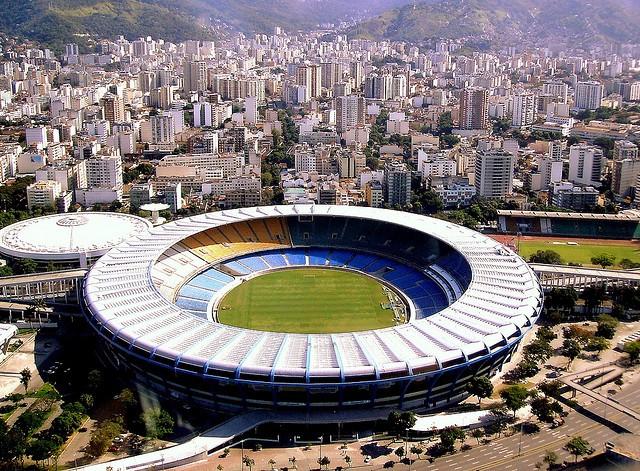
Editor’s Note: This post is part of a student blogging series on The Business Of Sports & Sustainability. Students attend the Presidio Graduate School which offers the only MBA-level sustainability program focused exclusively on the sports industry. You can follow the series here.
By Saul Estrada
Brazil is under an immense amount of pressure to deliver on its promise of Olympic gold. The 2016 Summer Olympics are now less than two years away, and the situation remains complicated in Rio de Janeiro. Demonstrations against corruption, poor public services, and the billions of dollars being spent on the World Cup and the Olympics are widespread.
Countless construction projects continue to be delayed, nearly half of Rio’s homes remain without proper connection to city sewage infrastructure, and violent crime continues to prevail as the city’s biggest threat. Despite these doubts, one stadium stands proud and prepared to shoulder the weight of a nation.
The Maracanã in Rio, South America’s largest stadium, was first built in preparation for the 1950 FIFA World Cup. It is as much a sporting arena as it is a historical monument for Brazilians, and now, as the Maracanã prepares to host the opening ceremony for the Rio 2016 Olympics, it’s prepared to show the world a new face.
The Maracanã in Rio received LEED Silver recognition in June of 2014 for its efforts to improve energy efficiency, reduce water consumption and carbon emissions, improve the local environment, and implement more efficient use of construction materials. The stadium was assessed in the areas of sustainable space, water, energy and atmospheric efficiency, materials and resources, internal environmental quality, innovation, and processes.
The highlight of the project is undoubtedly the solar photovoltaic plant installed on the roof of the structure: Approximately 1,500 solar panels give the Maracanã enough generation capacity to power the equivalent of 240 homes. The project meets 9 percent of the stadium's power needs, and though that might not seem like much, it serves as a critical platform for engaging staff and fans: Green energy now has a global stage to raise environmental awareness worldwide.
Energy-saving devices and a rainwater capture system that uses the modern roof to collect rainwater were also critical parts of the renovation. These projects together have reduced overall water use by 40 percent. “The rainfall captured by the roof is used to water the pitch and in the restrooms – all of which are equipped with intelligent faucets and flushing systems.” The Maracanã has also partnered with networks of local recycling material collectors to improve the waste management process and formalize recycling practices. The separation of recyclable material from the waste stream represents jobs and revenue for the collectors, and 7 tons of recyclables are diverted from landfill each month as a result of these partnerships.
Though Rio continues to face many challenges, the Maracanã stands as a symbol of pride and resilience. It demonstrates to the nation, and world, that old can again become new, without having to start from scratch. In an age of fancy new stadiums, a renovation-based solution might just be the thing we need in order to draw a greater number of individuals and organizations into the sustainability conversation.
Image credit: Flickr/Arthur Boppré
Saul Estrada is an operations professional with experience in building, energy and technology whose obsession with efficiency drives passion for the design of sustainable operating systems. LinkedIn.

This “micro-blog” is the product of the nations first MBA/MPA certificate program dedicated to sustainability in the sports industry. Led by Dr. Allen Hershkowitz, Senior Scientist at NRDC, The Business of Sports and Sustainability certificate is housed at Presidio Graduate School, the nation’s top sustainable MBA program. Posts explore the connection of sustainability with operations, branding and fan engagement of the sports industry including leagues, teams, venues, sponsors, vendors and surrounding communities.














